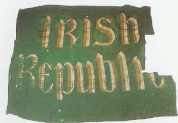I was a Nakba child. Born just 11 days before the official start of the great catastrophe that was imposed on the Palestinian people in May 1948, I have been aware from very early in my life of that foul genocide. For all of my life that genocide has continued.
My father Pearse, son of a 1916 revolutionary father and an equally revolutionary mother, always championed the rights of oppressed people throughout the world. No wonder, since James Connolly and Liam Mellows were the significant figures from our revolutionary period that my father held dear. Their parallel political philosophies informed his thinking, and in turn his children absorbed those ideas.
All of us were made aware of the great crimes committed by colonialists against the Native Americans – north and south, the people of Africa, India, Australia – and the Middle East. We were aware of the plight of the descendants of slaves in the US – still effectively slaves, still oppressed, exploited, abused in the 1950s and beyond. We were aware of the intolerable oppression visited by white settlers on the people of Rhodesia and particularly South Africa.
Pearse was a civil rights and human rights activist long before it became fashionable to be so. He rowed against the tide.
We were made aware of the similar experience in all of these colonies to our historical experience in Ireland at hands of the English – the greatest offenders in the past four centuries in worldwide colonisation, exploitation and atrocities against indigenous peoples. As a much older man, I now see the US take up that mantle.
But Palestine figured large in my father’s life. He understood what the Balfour Declaration – issued one year before his birth – had brought about for the people of Palestine. Understanding full well the divisions – largely on religious lines – that had been created in his own country by ‘Plantation’ and ‘Settlement’ policy, divisions that last to this day, he knew what that foul declaration was intended to do to the Palestinian people. And so it came to pass.
My father was an Irish republican, holding dear those Enlightenment values of Liberty, Equality and Fraternity, embodied in the Proclamation of the Irish Republic together with the explicit anti-sectarianism expressed in that document. He had equal respect for all, regardless of religious persuasion or none. That included Jews, of course.
No surprise that our optician, chosen by my parents, was Michael Stein of Harcourt Road, a Jewish man rated highly as a man, and optician, and friend, by both of them. There were two Jewish families on our road of fifty houses. No surprise that my younger brothers went on Saturdays – the Sabbath – to do those tasks forbidden to Jews on that day, and did it willingly, without question. No surprise, really, that my father raged at the outspoken anti-Jewish sentiment of a Nazi-sympathising Irish politician, Oliver J Flanagan, father of the current Minister for Foreign Affairs Charlie Flanagan – himself now a supporter of Zionist Israel.
No surprise, since my father’s aunt, sister of his revolutionary father, had married a Jewish man.
We, Pearse’s children, knew early on the difference between a Jew and a Zionist – one a religious belief system and the other a political ideology not confined to Jews. One he respected and cherished, the other he despised, not least for the damage it would do to Jews as well as Palestinians. He understood the great crimes visited on the Jews by the Nazis and others. But he also understood the great crime visited on the Palestinians decades before a Holocaust that they had no hand, act or part in creating or executing.
A few days before his death, I sat at my father’s bedside. He said that he was worried that anything he said about Israel or Zionism was unfair or unjust to Jews. I was able to reassure him, in full truth, that that was not the case.
That 27 years after his death that great crime of genocide against the Palestinian people continues unabated, and intensified, would shock him. He would be sickened by the slaughter of innocents in Gaza, by the deliberate targeting of homes, schools, even hospitals by crazed and psychotic and even psychopathic individuals who claim to represent the Jewish people, as if that was not, demonstrably, a great lie.
He would be even more sickened to know that in Ireland we have a government and a media to willingly, and with conviction, mouth Goebellsian propaganda to justify and prolong genocide. That is the polar opposite of James Connolly’s great wish that the Irish Republic would act as a beacon of hope to the oppressed people of the world. How far we have fallen.
We must confess our failure. We must rebuild ourselves as an ethical people. We must put into place in a constitution that is fit for purpose binding provisions to protect oppressed people, wherever they are, and to work actively to prosecute war crimes and crimes against humanity.
The immediate, pressing issue – the one that has lasted for all of my 66 years – is Palestine.
Rage. Rage against inhumanity. Rage against oppression. Rage against the slaughter of innocents. Rage against genocide. Rage against the perpetrators. Rage against the collaborators.
And channel that rage into ending this obscenity.
Free Palestine, without delay! Free Gaza, now!
